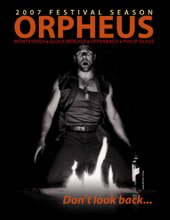Classic Opera Stories
Possibly the most commonly asked question for artists is "where do you get your ideas?" For most opera composers, the story is already written for them--they simply provide the music. Composers often draw the stories of their operas from the popular culture of the time. Popular legends, myths, books, plays, poems all became subjects of opera. Although most opera stories are set once, maybe a few times, and then retired, a few sources pop up over and over again over the course of music history.
 Greek myths served as the basis for most operas of the Baroque and Classical Eras, and continued to be mildly popular in the Romantic and Modern Eras. A popular source was Ovid's Metamorphoses, the basis for operas like Cavalli's La Calisto, Handel's Acis and Galatea, Handel's Semele, several operas by Lully, Mozart's first opera Apollo et Hyacinthus, Donizetti's first opera Il Pigmalione, Strauss' Daphne, and many operas about Orpheus.
Greek myths served as the basis for most operas of the Baroque and Classical Eras, and continued to be mildly popular in the Romantic and Modern Eras. A popular source was Ovid's Metamorphoses, the basis for operas like Cavalli's La Calisto, Handel's Acis and Galatea, Handel's Semele, several operas by Lully, Mozart's first opera Apollo et Hyacinthus, Donizetti's first opera Il Pigmalione, Strauss' Daphne, and many operas about Orpheus.
- Ludovico Ariosto wrote the epic poem Orlando Furioso, which served as the inspiration for Tasso's work Jerusalem Delivered and the basis for a slew of operas named Armide, set by Lully, Salieri, Gluck, Haydn, Rossini and others. The epic story La liberazione di Ruggiero dall'isola d'Alcina, also based on Ariosto's work was the inspiration for Francesca Caccini, Luigi Rossi, Handel, Vivaldi, Lully, Rameau, and Haydn, among others.
 William Shakespeare became popular in the opera world about 200 years after his death, during the Romantic Era. Many of his plays enjoy one or more opera settings. The Merry Wives of Windsor about the lusty knight Falstaff was set by Salieri, Nicolai, Verdi, Holst, and Vaughn Williams. The ever-popular Romeo and Juliet was set by Gounod, Delius, Bernstein, Bellini, and Vaccai. Glimmerglass Opera is basing its 2008 season around tales told by the prolific bard, including Handel's Giulio Cesare in Egitto, Bellini's I Capuleti e i Montecchi (based on the story that inspired Romeo and Juliet), Wagner's Das Liebesverbot (based on Measure for Measure), and Cole Porter's Kiss Me Kate (based on The Taming of the Shrew.)
William Shakespeare became popular in the opera world about 200 years after his death, during the Romantic Era. Many of his plays enjoy one or more opera settings. The Merry Wives of Windsor about the lusty knight Falstaff was set by Salieri, Nicolai, Verdi, Holst, and Vaughn Williams. The ever-popular Romeo and Juliet was set by Gounod, Delius, Bernstein, Bellini, and Vaccai. Glimmerglass Opera is basing its 2008 season around tales told by the prolific bard, including Handel's Giulio Cesare in Egitto, Bellini's I Capuleti e i Montecchi (based on the story that inspired Romeo and Juliet), Wagner's Das Liebesverbot (based on Measure for Measure), and Cole Porter's Kiss Me Kate (based on The Taming of the Shrew.)
- Goethe's Faust--Originally a folk legend, the story of the man who sold his soul to the devil was made into a play by Christopher Marlowe (c. 1600) and Goethe (1832). The Goethe play was the basis for several operas by composers like Gounod, Berlioz, and Boito. Texts by Goethe were also extremely popular for lieder composers.
